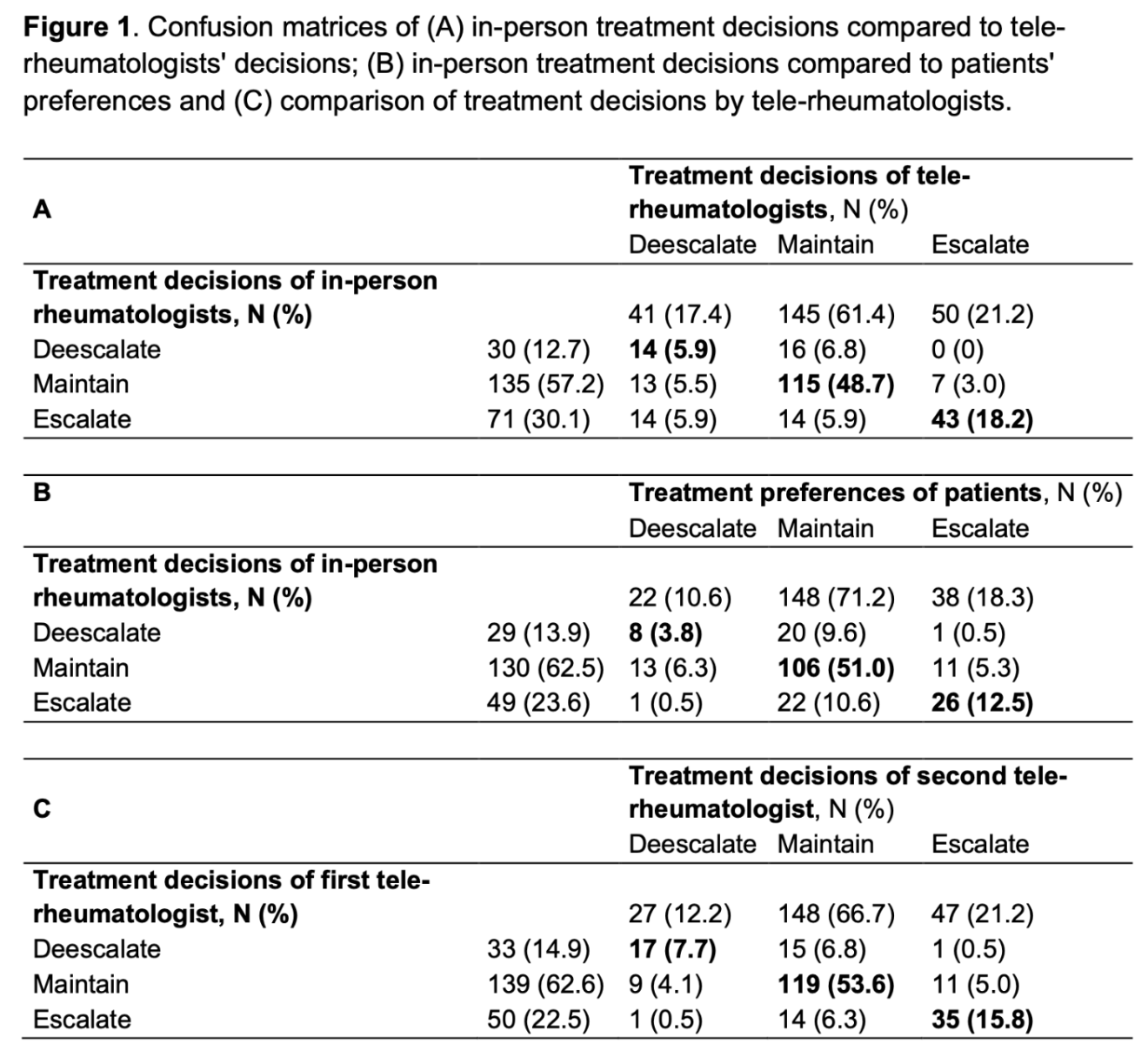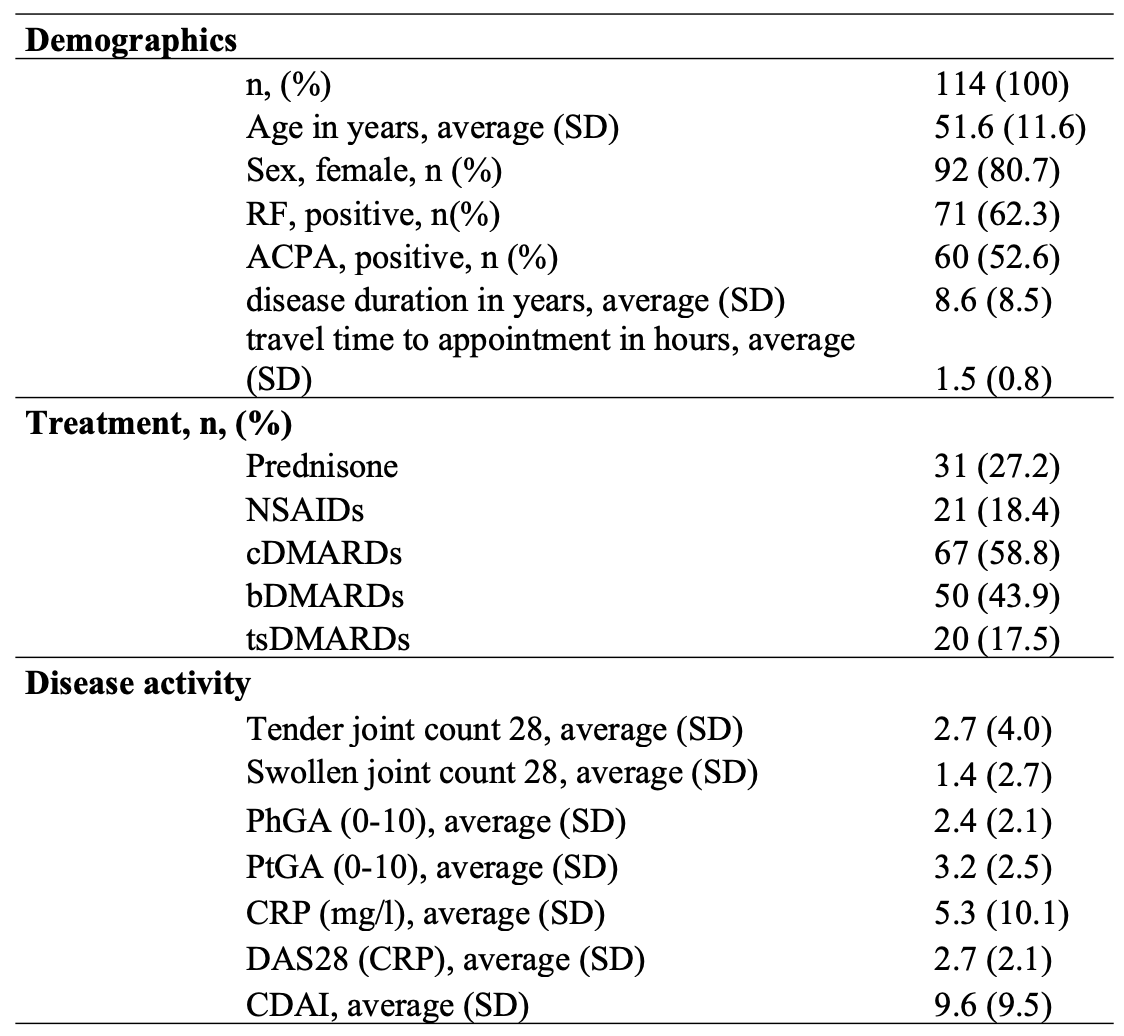Session Information
Session Type: Abstract Session
Session Time: 3:00PM-4:30PM
Background/Purpose: Access to rheumatology care is becoming increasingly limited, necessitating a re-evaluation of patient pathways. The objective of this study was to evaluate a new patient pathway promoting patient empowerment, including remote patient monitoring (RPM) and asynchronous electronic visits (e-visits) in patients with rheumatoid arthritis (RA).
Methods: In this prospective, multi-center, randomized controlled trial performed at four German university outpatient services, adult patients with established RA and able to use a smartphone were included. Patients and rheumatologists used a tele-rheumatology platform to document and visualize the results of a self-performed quick CRP-test, self-performed joint count, and electronic patient-reported outcomes (ePROs) in between a baseline in-person visit (T0) and a three-month follow-up (T1). The treating rheumatologist recorded the treatment decision and patients recorded their therapeutic preference. Two independent randomized tele- rheumatologists from different university centers were given access to this information and the medical history via the tele-rheumatology platform. Based on this information they determined a remote asynchronous treatment decision (escalate, maintain, deescalate). The primary outcome was treatment concordance of in-person and tele-rheumatologists. Concordance of patients’ preferences and rheumatologists’ treatment decisions was assessed. Likelihood of patients to recommend e-visits to other patients was investigated using the net promoter score (NPS).
Results: 115 consecutive RA patients were recruited between August 12th 2021 and November 27th 2023 of which 114 patients were included in the analysis presented. 92/114 (80.7%) were female, mean age was 51.6 years and mean disease duration was 8.6 years, see table 1. Overall treatment concordance of F2F- and tele-rheumatologists was 72.9%, see Fig. 1A. 12.3% of discordant decisions represented deviations of maintaining / deescalating treatment. Concordance was highest for maintaining treatment regimen (85.2%), followed by treatment escalation (60.6%) and de-escalation (46.7%). Concordance between patient preference and in-person rheumatologists was 67.3%, see Fig. 1B. Concordance of tele-rheumatologists was 77.1%, see Fig. 1C. Patient recommendation rate of e-visits was mixed at T0 with a NPS of – 23.7% (promoters(9-10): 24.6%; detractors(1-6): 48.2%; mean ± SD 6.6 ± 2.5) and slightly increased at T1 with a NPS of -17.9% (promoters(9-10):27.4%; detractors(1-6): 45.3%; mean ± SD 6.2 ± 3.1).
Conclusion: TELERA is the first trial to investigate treatment decisions by asynchronous virtual visits compared to traditional in-person visits in rheumatology. The high treatment concordance observed in virtual visits, especially in stable patients where treatment can be maintained, demonstrates the feasibility and potential to alleviate rheumatology pressures.
To cite this abstract in AMA style:
Knitza J, Mucke J, Grahammer M, Kuhn S, Vuillerme N, Muehlensiepen F, Krönke G, Schett G, Pecher A, Krusche M. Treatment Concordance of Asynchronous Virtual Visits Compared to Traditional In-person Visits in Patients with Rheumatoid Arthritis: Results of the Prospective, Multi-center, Randomized Controlled TELERA Trial [abstract]. Arthritis Rheumatol. 2024; 76 (suppl 9). https://acrabstracts.org/abstract/treatment-concordance-of-asynchronous-virtual-visits-compared-to-traditional-in-person-visits-in-patients-with-rheumatoid-arthritis-results-of-the-prospective-multi-center-randomized-controlled-tel/. Accessed .« Back to ACR Convergence 2024
ACR Meeting Abstracts - https://acrabstracts.org/abstract/treatment-concordance-of-asynchronous-virtual-visits-compared-to-traditional-in-person-visits-in-patients-with-rheumatoid-arthritis-results-of-the-prospective-multi-center-randomized-controlled-tel/


